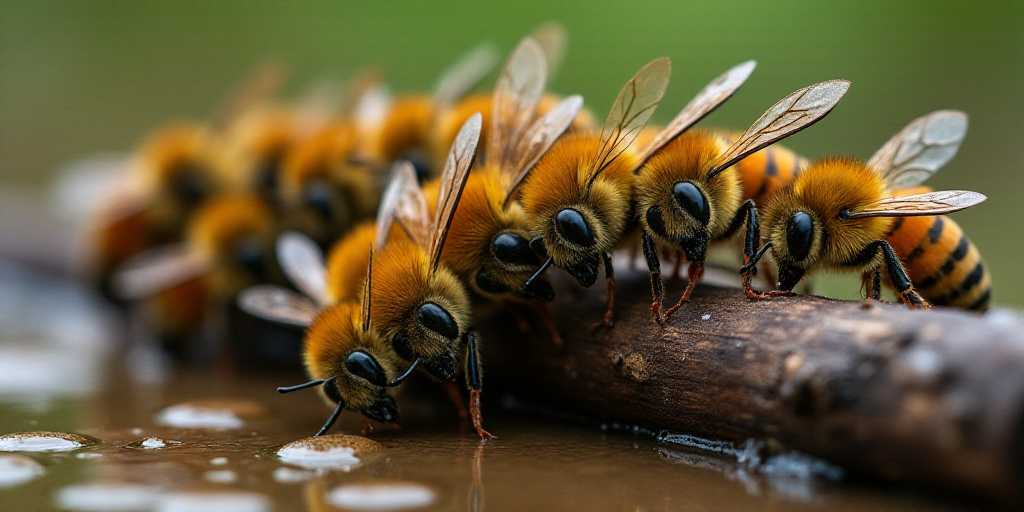The Weight of Pesticides and Habitat Loss
Mexico is facing a disturbing trend of mass bee deaths, with over 3,300 hives lost in Hopelchén, Campeche due to fipronil poisoning in 2023. In Colima, a single event in Tecomán resulted in the loss of 968 hives following agricultural fumigations. Yucatecan Mayan communities have seen their apiaries disappear entirely after agricultural fumigations.
The Alianza Maya por las Abejas estimates that over 301,000 colonies have been lost in Mexico in the last decade, though no official consolidated record exists.
Research has identified up to nine distinct agrochemicals in dead bees, many of which are neurotoxic. Fipronil and neonicotinoids (imidacloprid, thiamethoxam) are the primary culprits. These substances are banned in the European Union but are widely used in Mexico for soybean, corn, and citrus cultivation.
Deforestation, particularly in the Yucatan Peninsula, and climate change further exacerbate the situation by altering flowerings and subjecting pollinators to extreme droughts and more intense hurricanes.
The Value of Bees for the Mexican Economy
More than 85% of Mexico’s national crops depend on pollinators. Bees provide an annual agricultural service worth 79,441 million pesos, nearly a fifth of the country’s agricultural production, according to data from the Secretariat of Agriculture (Sader).
Beyond economics, bees represent a cultural and spiritual heritage in Mayan communities that is now at risk.
Colima Sets the Course: Jail Those Who Kill Bees
Amidst this grim situation, Colima has become a national model by approving the first Agroecology Law and criminalizing mass bee deaths. The reform to Article 196 of the Penal Code imposes two to eight years in prison for those causing these mortalities with agrochemicals.
In an exclusive interview with Bistronomie from El Economista, Morena local representative and social activist Alfredo Álvarez Ramírez explained the significance of this step:
“If they disappear, we do too. They are a warning that something is happening with the environment, and we still have time to correct it.”
Álvarez Ramírez warns about fipronil: “Bees lose their orientation, get disoriented and die. They are very sensitive to environmental changes, and the chemicals are deadly for them.”
A Global Problem, a Local Opportunity
The Mexican crisis mirrors an international trend: the UN estimates that 35% of the planet’s pollinators are at risk of extinction. In Brazil, the death of 500 million bees was documented over three months following the relaxation of agrochemical use.
Colima aims to set an example by implementing its Agroecology Law and custody chain workshops, providing legal tools for beekeepers and enforcers to penalize those responsible. “It’s not just about a law on paper; it should have real effects,” asserts Álvarez Ramírez.
Without Bees, There Is No Tomorrow
Mexico stands at a critical juncture: either replicate Colima’s model to protect its pollinators or face irreversible consequences for food production and biodiversity.
“This struggle isn’t mine; it’s the beekeepers’, science, and society. I merely articulated those voices in Congress. Protecting bees is protecting life and ensuring Mexico’s food self-sufficiency,” concludes the legislator.
Key Questions and Answers
- What is causing the mass bee deaths in Mexico? The primary causes are agrochemicals, such as fipronil and neonicotinoids, which are widely used in Mexico for soybean, corn, and citrus cultivation. Deforestation and climate change also contribute to the problem.
- How many bee colonies have been lost in Mexico? The Alianza Maya por las Abejas estimates over 301,000 colonies have been lost in the last decade.
- What is the economic value of bees in Mexico? Bees provide an annual agricultural service worth 79,441 million pesos, nearly a fifth of the country’s agricultural production.
- What has Colima done to address this issue? Colima approved the first Agroecology Law and criminalized mass bee deaths, imposing penalties of two to eight years in prison for those causing these mortalities with agrochemicals.
- Why are bees crucial for biodiversity and food production? Bees play a vital role in pollinating more than 85% of Mexico’s national crops, ensuring food production and biodiversity.






